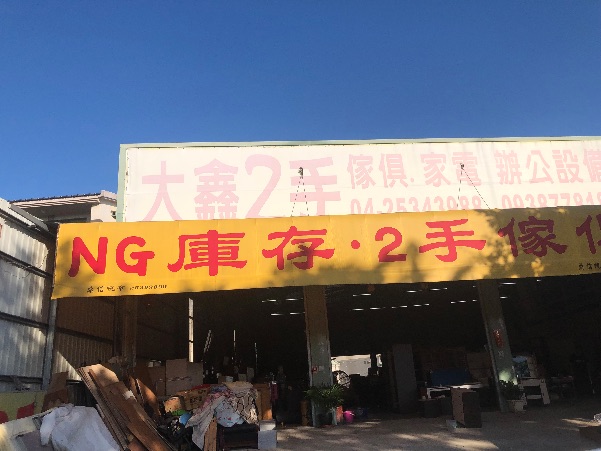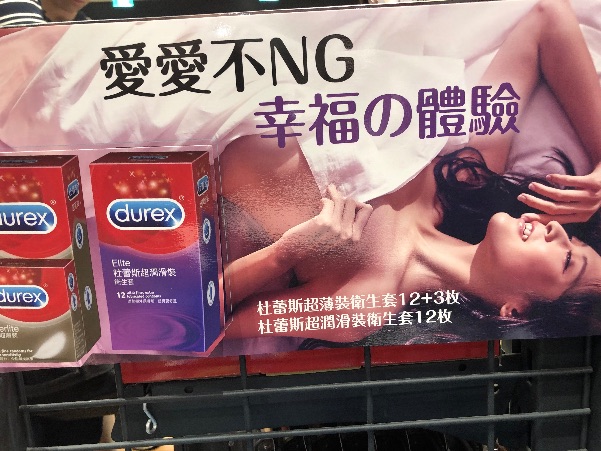"NG" and "CP" in Taiwan
« previous post | next post »
From an anonymous contributor:
Surprisingly for a store that is advertising its wares, the "NG" on this sign stands for "not good". The "kùcún 庫存" means "(in) stock; inventory". The right side of the sign tells us that the store also sells 2nd hand tools / utensils / furniture (using a Taiwanese [ke-si / kee-si] / Cantonese [gaa1si1] term — 傢俬 / 家俬 that has also been borrowed by other Sinitic topolects, including Mandarin).
In fact, as used in Taiwanese merchandising, "NG" seems to mean about the same as "imperfect ("A piece of merchandise having a minor flaw that does not impair its use, usually sold at a discount." [American Heritage Dictionary of the English Language, 5th ed.]) or "second" ("often seconds An article of merchandise of inferior quality." [American Heritage Dictionary of the English Language, 5th ed.]) in English. This usage apparently originated in Japan and was brought back to the States after WWII. Most people from Taiwan whom I asked about NG and use the expression themselves are unaware that it literally means "not good".
Melvin Lee explains:
Many people would buy "NG" products in Taiwan. They are usually perfectly fine products but don't look as good in appearance due to some minor mistakes during production. These products are usually much cheaper in price. When stores have big sales, they will clear the inventory by putting a lot of these NG products on special sale. In fact, many bakeries in Taipei like to put the "NG" pastries by the cashier counter and they actually are quite popular and are usually sold out very fast.
And here, from a Taipei supermarket, is a product that is "bù NG 不 NG ("not not good"):
The first two large characters mean "love love"; the second line of large characters means "blissful experience".
Note the use of the Japanese kana "no の" for the possessive particle "ê [e]". See "No character for the most frequent morpheme in Taiwanese" (12/10/13).
Another widely used acronymic expression in Taiwan is "CP", as in "CP zhí CP值" ("CP value") (e.g., see this article on buffets in the Taipei area). The most convincing explanation I have received for "CP" in this expression is that it stands for "cost-performance [ratio]", although again, as with "NG", people who employ this expression may be unaware of the English terminology behind it.
In vernacular Mandarin, the equivalent expression would be "huásuàn 划算" ("cost-effective"). Another explanation for "CP zhí CP值" ("CP value") is that it is equivalent to "price–performance ratio", the comparable term for which in Chinese is "xìngjiàbǐ 性價比".
For people in Taiwan to use "NG" and "CP" without knowing exactly what they mean in English is not much different from people around the world — including Americans — using the American expression "OK" without realizing that it comes from "all correct".
Selected readings
- "'No' in Chinese" (3/19/19)
- "Keep on -inging" (10/30/17)
- "I don't feel OK" (12/27/18)
- "Burlesque Matinée at the Max Planck Gesellschaft" (12/4/08)
[Thanks to Grace Wu]


Mark S. said,
November 24, 2019 @ 8:09 am
It's my understanding that NG came to Taiwan via Japanese English. Originally it was applied to things like gag/blooper reels as DVD extras. Within the past decade or so the meaning has expanded to the "imperfect" sense.
Rodger C said,
November 24, 2019 @ 9:30 am
The usual American retail term for this is "as is."
Jonathan said,
November 24, 2019 @ 11:46 am
Is anyone else familiar with the term "blem", as a slang for "with blemishes but fully functional"? I've only heard it used for car tires, and haven't heard it used in years, but it seems like the best equivalent in English to "NG" that I know.
Michael Watts said,
November 24, 2019 @ 3:24 pm
My idea of the closest English term to NG was "factory reject".
Robert said,
November 24, 2019 @ 4:17 pm
@Michael Watts, here in Australia we have a chain of dollar/dime/etc stores called The Reject Shop for precisely this reason, despite their stock (at least these days) being not factory rejects/seconds.
Jonathan Smith said,
November 24, 2019 @ 11:15 pm
To be more precise aiai 爱爱 means WooHoo ;P
Victor Mair said,
November 24, 2019 @ 11:59 pm
To be sure, 爱 + 爱 = WooHoo!
John Shutt said,
November 25, 2019 @ 9:14 am
Curious. I recall "NG" = "No Good" from the 1989 SF novel /Rimrunners/ by CJ Cherryh.
John Shutt said,
November 25, 2019 @ 1:48 pm
(I suppose, since I mentioned it at all, I should explain that a bit. I'd not have thought of it if NG were a general term of disapproval; it (or NDG=No Damn Good) was, we were told, what you painted on something you were sending to trash. Which was what reminded me of it.)
The Suffocated said,
November 26, 2019 @ 1:23 am
While the "NG" in the condom advertisement does stand for "no good", here I think it specifically refers to the widely used Asian cinematic term "NG", which means a bad take.
Philip Taylor said,
November 27, 2019 @ 6:02 am
'My idea of the closest English term to NG was "factory reject"' — "seconds" is the first term that comes to my (British English) mind.
Jade said,
December 5, 2019 @ 10:01 am
In fact, many shop names in China often have capital letters in them, not only shop names, but also names of all kinds of things. Maybe they didn't consider what that means in English when they named them, they just thought it sounded good, or they named them at the beginning of their names.